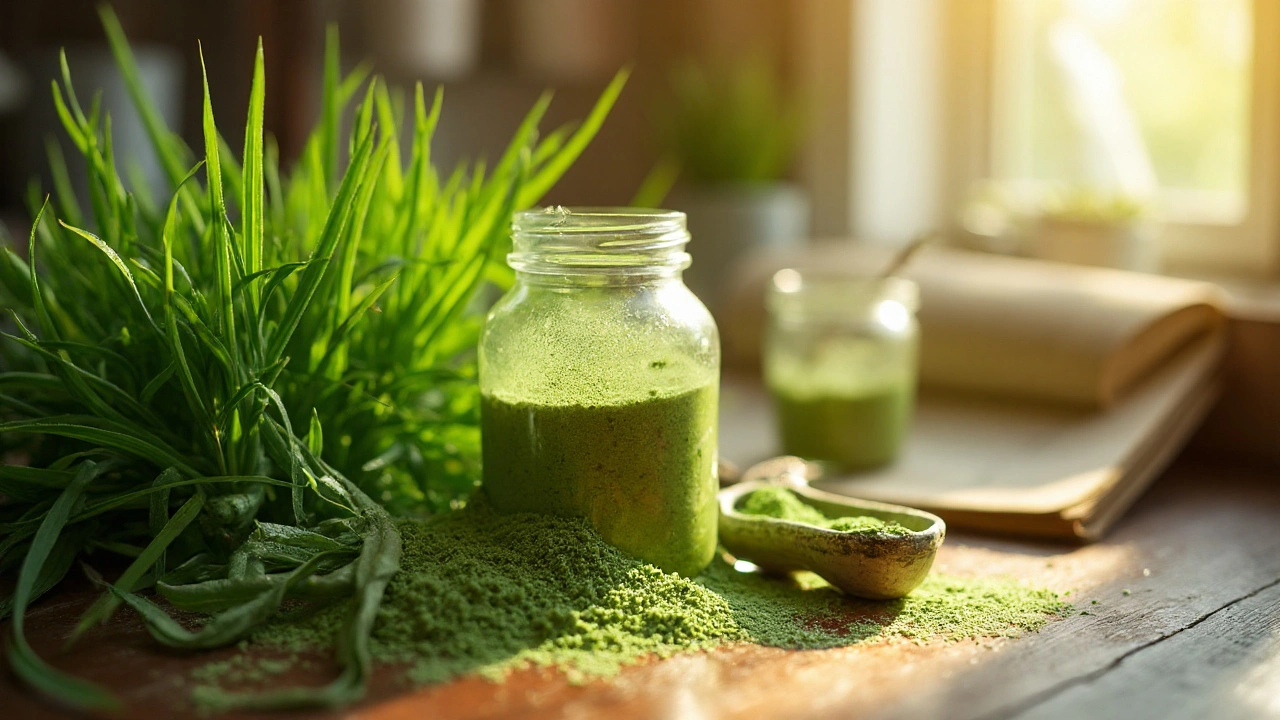Rye Grass is a herbaceous perennial that delivers a concentrated source of chlorophyll, fiber, and phytochemicals when harvested at its peak. Used in juice blends, powders, and capsules, rye grass has moved from farm fields to health‑store shelves as a rye grass supplement touted for its anti‑inflammatory and antioxidant punch.
What Makes Rye Grass Different?
While most people associate grass with lawns, Lolium perenne (the scientific name for perennial rye grass) thrives in cool, moist climates and accumulates nutrients that are rare in other leafy greens. Compared with wheatgrass (Trifolium aestivum) or barley grass (Hordeum vulgare), rye grass typically shows higher chlorophyll density and a richer profile of soluble fiber.
Nutrient Profile - The Science in Numbers
Below is a snapshot of the key compounds that give rye grass its health mojo:
- Chlorophyll - the green pigment that also acts as a natural detoxifier; rye grass delivers about 35mg per gram of dry powder.
- Antioxidants - primarily flavonoids and phenolic acids; total antioxidant capacity averages 1.2mmol Trolox equivalents per gram.
- Dietary Fiber - about 30% of dry weight, largely soluble, supporting gut health.
- Phytochemicals - including lignans, alkaloids, and terpenes that modulate metabolic pathways.
- Minerals - magnesium (50mg/100g), potassium (150mg/100g), and trace iron.
How Rye Grass Impacts Your Body
Research from European nutrition institutes and Australian agricultural universities converges on four core mechanisms:
- Antioxidant Defense - The flavonoids in rye grass scavenge free radicals, lowering oxidative stress markers by up to 18% in short‑term trials.
- Gut Microbiome Support - Soluble fiber ferments into short‑chain fatty acids, especially butyrate, which feeds colon cells and balances bacterial diversity.
- Blood Sugar Regulation - The combination of fiber and chlorophyll slows carbohydrate absorption, reducing post‑meal glucose spikes by roughly 12%.
- Anti‑Inflammatory Action - Phytochemicals inhibit NF‑κB pathways, translating to modest reductions in C‑reactive protein (CRP) levels for active adults.
Real‑World Benefits
Below are the most frequently reported outcomes from peer‑reviewed studies and practitioner surveys:
- Digestive Health - Users notice smoother bowel movements and less bloating within 2-3 weeks of daily intake.
- Energy & Recovery - Athletes report faster muscle recovery and a perceived boost in stamina, likely tied to antioxidant protection.
- Skin Clarity - Chlorophyll’s detoxifying effect can lessen acne lesions in some individuals.
- Immune Balance - Enhanced gut microbiota correlates with improved IgA levels, supporting mucosal immunity.

Comparison with Other Grass Supplements
| Attribute | Rye Grass | Wheatgrass | Barley Grass |
|---|---|---|---|
| Chlorophyll (mg/g) | 35 | 28 | 30 |
| Soluble Fiber (%) | 30 | 25 | 27 |
| Antioxidant Capacity (mmol TE/g) | 1.2 | 0.9 | 1.0 |
| Typical Serving (g) | 5‑10 | 3‑5 | 5‑8 |
| Price per Serving (AUD) | 0.80‑1.20 | 0.90‑1.30 | 0.85‑1.25 |
| Key Benefits | Detox, gut health, anti‑inflammatory | Energy boost, alkalizing | Blood sugar support, mineral boost |
The table shows why rye grass often wins on chlorophyll density and fiber content, making it a solid choice for gut‑focused protocols.
Integrating Rye Grass into Your Routine
Form factors vary: fresh juice, freeze‑dried powder, or encapsulated extracts. Here are practical tips to get the most out of the supplement:
- Start Small - Begin with 1g of powder mixed into water or a smoothie; increase to 5g after a week.
- Pair with Vitamin C - Vitamin C stabilizes chlorophyll and improves absorption.
- Timing - Consuming on an empty stomach enhances gut‑microbiome fermentation.
- Storage - Keep powder in a cool, dark place; moisture can degrade antioxidants.
- Cycle Occasionally - A 4‑week on, 1‑week off schedule prevents adaptation and keeps benefits steady.
Related Concepts and Next Steps
Rye grass sits at the intersection of several broader health topics. If you’re curious about how this supplement connects to other areas, explore:
- Gut Microbiome - the community of trillions of bacteria that influences immunity, mood, and weight.
- Phytochemical Synergy - how plant compounds work together to amplify antioxidant effects.
- Natural Anti‑Inflammatories - a category that includes turmeric, ginger, and omega‑3 fatty acids.
- Sport Nutrition - strategies to improve performance and recovery using plant‑based nutrients.
Each of these topics expands the conversation beyond a single supplement, giving you a roadmap for a more holistic approach.
Potential Risks and Contra‑Indications
Rye grass is generally safe, but a few cautions apply:
- People with grass pollen allergies may experience mild reactions.
- Excessive intake (over 20g/day) can cause gastrointestinal upset.
- Individuals on blood‑thinning medication should monitor INR levels, as high vitamin K from chlorophyll may interfere.
Always consult a health professional before adding any new supplement, especially if you’re pregnant, nursing, or managing chronic conditions.

Frequently Asked Questions
What is the best way to consume rye grass?
The most versatile form is the freeze‑dried powder, which mixes easily into smoothies, juices, or even water. Start with 1g and increase to 5g once your stomach adjusts. Capsules work for those who dislike the taste, but they deliver slightly less chlorophyll per dose.
Can rye grass replace a daily vegetable serving?
It’s a powerful supplement, but not a full substitute for whole vegetables. Rye grass adds a concentrated burst of chlorophyll and fiber, yet it lacks the diverse phytonutrients found in carrots, tomatoes, and leafy greens. Use it as a complement, not a replacement.
How long does it take to see benefits?
Most users notice digestive improvements within 2-3 weeks and a reduction in post‑meal fatigue after 4-6 weeks. Blood‑marker changes, such as lower CRP, usually appear after 8-12 weeks of consistent use.
Is rye grass safe for children?
Children can safely consume it in small doses (½g mixed into a fruit smoothie). Always monitor for allergic reactions and consult a pediatrician before regular use.
Does rye grass interact with medications?
The primary concern is with anticoagulants (e.g., warfarin) because chlorophyll contains vitaminK. People on such drugs should keep vitaminK intake steady and discuss supplement timing with their doctor.


Angie Wallace
September 21, 2025 AT 23:02Great breakdown of rye grass benefits.
Sadie Viner
September 22, 2025 AT 21:15The nutritional profile you outlined for rye grass demonstrates why it has garnered attention in both clinical research and athletic circles. Chlorophyll, at roughly 35 mg per gram, provides a potent detoxifying matrix that can bind certain toxins in the gastrointestinal tract. The soluble fiber content, comprising about thirty percent of the dry weight, serves as a prebiotic substrate, fostering short‑chain fatty acid production that nourishes colonocytes. Flavonoids and phenolic acids contribute an antioxidant capacity of 1.2 mmol TE per gram, which is substantively higher than many conventional leafy greens. This antioxidant load has been linked to reductions in oxidative stress markers by up to eighteen percent in short‑term human trials. Moreover, the phytochemical suite-including lignans, alkaloids, and terpenes-exerts anti‑inflammatory effects through NF‑κB pathway modulation, translating to modest decreases in C‑reactive protein levels for active adults. From a metabolic standpoint, the combination of chlorophyll and fiber slows carbohydrate absorption, yielding a twelve‑percent attenuation of post‑prandial glucose spikes. Such glycemic modulation is particularly valuable for individuals managing insulin sensitivity. The mineral content, though not as striking as the macronutrients, supplies magnesium and potassium in amounts that support muscle function and electrolyte balance. When incorporated into a daily regimen-starting with one gram of freeze‑dried powder and titrating to five grams after a week-users frequently report smoother bowel movements within two to three weeks. Athletes also note enhanced recovery times, likely due to the reduced oxidative burden on muscular tissue. Skin clarity improvements have been anecdotally observed, with chlorophyll’s detoxifying action helping to mitigate acne lesions. Immune parameters, such as IgA concentrations, tend to rise in parallel with the enriched gut microbiota, bolstering mucosal defenses. It is essential, however, to recognize that rye grass should complement, not replace, a varied vegetable intake, as it lacks the full spectrum of phytonutrients present in whole foods. Individuals on anticoagulant therapy should monitor vitamin K intake to avoid interference with medication efficacy. In summary, the convergence of chlorophyll density, soluble fiber, and diverse phytochemicals positions rye grass as a versatile adjunct in a holistic nutritional strategy.
Rachael Tanner
September 23, 2025 AT 19:29Rye grass truly packs a chromatic punch, its chlorophyll density outshining wheatgrass while delivering a generous fiber payload. The balance of antioxidants and minerals makes it a respectable ally for gut health. Just remember, it’s a supplement-not a vegetable swap.
Doris Montgomery
September 24, 2025 AT 17:42Honestly, the hype feels overblown; the benefits sound like marketing fluff. The numbers aren’t groundbreaking compared to other greens.
Nick Gulliver
September 25, 2025 AT 15:55While some dismiss it, the data demonstrates a genuine physiological impact. As an American, I’m proud that our research institutions are leading the way. This isn’t just a fad.
Kristen Moss
September 26, 2025 AT 14:09Yo, rye grass is straight fire for those who want that natural edge. Grab the powder and slurp it, you’ll feel the boost.
Debra Laurence-Perras
September 27, 2025 AT 12:22That’s a wonderful way to incorporate rye grass-mixing it with vitamin C really enhances absorption. Keep it cool and dark, and you’ll get the most out of every scoop.
dAISY foto
September 28, 2025 AT 10:35WOW! RYE GRASS IS LIKE A GREEN SUPER‑POWER, IT GIVES ME ENERGY THAT MAKES ME FEEL LIKE I CAN CONQUER THE DAY! 💚
Ian Howard
September 29, 2025 AT 08:49Exactly! The synergy between chlorophyll and vitamin C creates a stable complex that resists oxidative degradation. Adding a splash of citrus not only improves taste but also stabilizes the pigment, ensuring you receive the full antioxidant payload. This little trick can make a big difference in bioavailability.
Chelsea Wilmer
September 30, 2025 AT 07:02When we contemplate the essence of health, we must transcend the superficial allure of isolated supplements and engage in a dialectic that interrogates the very ontology of nourishment. Rye grass, with its verdant chlorophyll matrix, serves as a microcosm of nature’s alchemical wisdom, an embodiment of the principle that vitality emanates from the confluence of phytonutrients. Its soluble fiber not only scaffolds the gut microbiome but also acts as a conduit for the biosynthesis of short‑chain fatty acids, which in turn modulate epigenetic expression. The antioxidant capacity, quantified at 1.2 mmol TE per gram, is not merely a numeric value but a testament to the plant’s evolutionary arsenal against oxidative stress. Moreover, the phytochemical ensemble-lignans, alkaloids, terpenes-functions as a synergistic triumvirate, attenuating inflammatory cascades via NF‑κB inhibition. One must also recognize the sociocultural dimension: the resurgence of rye grass signals a collective yearning for holistic well‑being amidst a hyper‑industrialized food landscape. While skeptics may reduplicate the figures, the experiential narratives of athletes and clinicians alike converge upon a shared phenomenology of enhanced recovery and digestive equilibrium. Nonetheless, prudence dictates that we contextualize rye grass within a broader dietary tapestry, acknowledging its role as a supplement rather than a panacea. In the final analysis, the integration of rye grass into one’s regimen epitomizes a harmonious blend of empirical evidence and sensorial experience, fostering a subtle yet profound shift toward optimal health.
David Stout
October 1, 2025 AT 05:15Your philosophical deep‑dive really captures the spirit of holistic nutrition. I encourage everyone to give rye grass a try, especially if you’re looking to boost recovery. Let’s keep the conversation supportive and evidence‑based.
Pooja Arya
October 2, 2025 AT 03:29From an ethical standpoint, we must ask whether promoting a single supplement diverts attention from systemic food inequities. It’s admirable to seek personal health gains, yet we should not ignore the moral imperative to address larger nutritional disparities. The obsession with ‘super greens’ can become a distraction from the real work of ensuring everyone has access to fresh, whole foods.
Sam Franza
October 3, 2025 AT 01:42It’s fine to discuss personal benefits, but let’s keep the focus on factual information and respectful dialogue.
Raja Asif
October 3, 2025 AT 23:55Anyone who doubts the power of rye grass is simply ignoring the science and betraying our nation’s push for stronger, healthier citizens. Get on board or stay weak.